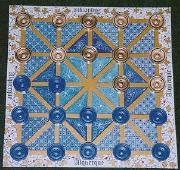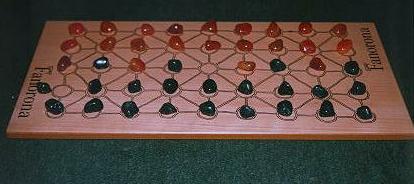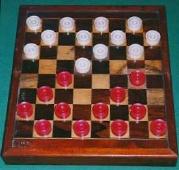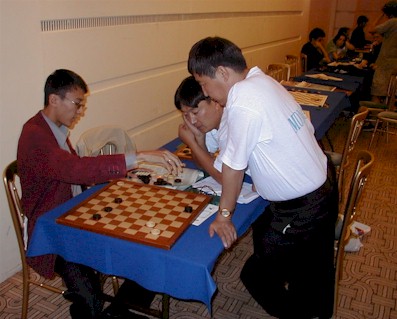 |
Draughts is a very ancient game indeed, the origins of which, like Chess, aren't completely clear. However, early forms of Alquerque, its venerable ancestor, have been found in Egypt dating at least as early as 600BC. Alquerque boards can be seen carved into the stone slabs which form the roof of the great temple at Kurna, Egypt, which was built in 1400BC (of course, they might have been carved at any point since). The game of Alquerque was played like Draughts on a 5 x 5 point board with the pieces starting in a non-symmetrical pattern. The game clearly had staying power - it is mentioned under the name of Quirkat in the Arabic work Kitab-al Aghani, the author of which died in 976 AD. Quirkat was first brought to Europe by the Moors during their invasion of Spain. It was recorded as Alquerque (Spanish form of El-Quirkat) in the Alfonso X Manuscript which was written between 1251 - 1282 at the command of Alfonso X, King of Leon and Castile. The image shows a modern commercial version of the game owned by the author. |
The Madagascan game of Fanorona is a descendant of Alquerque. It seems
to have been invented around 1680 AD and is still played today.
Board shown is a modern German version from the author's collection. |
 |
Sometime later, around 1100, possibly in the South of France, somebody decided to play Alquerque on a Chess board instead of the standard Alquerque board. The game was played with 12 pieces on each side and was called Fierges or Ferses at first although this changed to Dames later. The game did not force a player to take enemy pieces when the opportunity presented itself.
 |
The compulsory rule forcing a player to take whenever possible was introduced
in France around 1535, the resulting new game being called Jeu Force. At
this point the old game without huffing became known as Le Jeu Plaisant
De Dames or Plaisant for short. The first book written on the game was published
in Valencia, Spain in 1547 and now resides in the Royal Library of Madrid.
Jeu Force is the game played in England today under the name of Draughts
and the game was taken to America and called Checkers. The first book in
English about it was written in 1756 by William Payne, a mathematician from
London.
The board to the left was made around the turn of the century. It is of a common design being able to fold in half to form a box containing the the pieces, when the board is stored. An English Draughts board is on the outside and a Backgammon board is marqueted within. From the author's parent's collection. |
Draughts is known by different names around the world:
USA - Checkers
Spain and Italy - Dama
France - La Jeu de Dames
Poland - Aracaby
Germany - das Damenspiel
 Most
of the rest of Western Europe took to playing a different development of Le
Jeu Plaisant De Dames which appeared in Paris in 1727 and which is now the internationally
recognised game of Polish Draughts or Continental Draughts. This game is superior
in complexity to English draughts by virtue of the fact that it is played on
a board ten squares by ten squares and that capturing moves have an extended
scope. It isn't believed to have been invented in Poland at all and they
apparently know it as 'French Draughts' there! Polish Draughts was probably
the name given in order to make it sound slightly different to West European
ears in the same way as for Chinese Checkers and Russian
Billiards.
Most
of the rest of Western Europe took to playing a different development of Le
Jeu Plaisant De Dames which appeared in Paris in 1727 and which is now the internationally
recognised game of Polish Draughts or Continental Draughts. This game is superior
in complexity to English draughts by virtue of the fact that it is played on
a board ten squares by ten squares and that capturing moves have an extended
scope. It isn't believed to have been invented in Poland at all and they
apparently know it as 'French Draughts' there! Polish Draughts was probably
the name given in order to make it sound slightly different to West European
ears in the same way as for Chinese Checkers and Russian
Billiards.
Some areas of South East Asia go one better and play on a board of twelve by twelve squares and 24 pieces each side. The Canadian Draughts variant is also played upon a board this size.
|
Above is a typical Sri Lankan board with the requisite 144 squares |
And here are a couple of Sri Lankans playing on a home made board in Anuradhapura. They have found some light and dark stones to use as pieces. |
Masters Games sell a Giant Draughts set for the garden and/or public entertainment.
Free rules for some variants of the game can be found at Masters Games.
International Draughts An excellent page on the main game of today.
In Holland, they play a game called Frisian Draughts in which they capture both orthogonally and diagnonally. Dambond Fres Spiel is in Dutch.
![]()
| The Online Guide to Traditional Games Home | Copyright ķ 1997-2001 by AGames. |